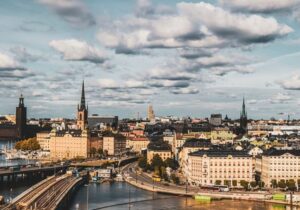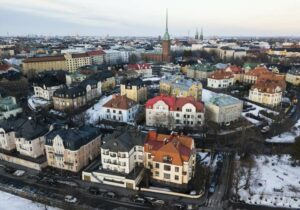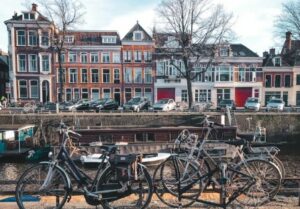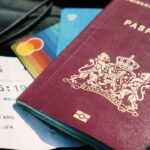Europe is a diverse continent. Travelling from Venice, Italy to Ljubljana, Slovenia will give you whiplash with how different the cultures can be, despite the countries sharing a border.
With over 44 sovereign countries and more than 250 languages, moving to Europe almost guarantees that you will find a culture you can relate to.
No matter why you’re relocating, it’s good to know which passports are most powerful to make the best choice. Let’s look at the factors of a strong passport and the top 5 European passports that measure up.
5 Factors That Define a Strong European Passport
 Visa-Free Access
Visa-Free Access
Visa-free access means that individuals who have a particular passport have the ability to travel to a foreign country without needing to apply for and present a visa to enter.
This means no need to wait in line at borders, no personal information exchange with officials and the ability to travel more spontaneously.
A passport that allows a person to enter and exit various countries without a visa is quite sought after. It shows the world that the country is politically and economically stable, which is attractive to financial investors.
Travel freedom is appealing to businesspeople as it makes meeting and negotiating much easier. This stimulates trade between countries and promotes economic growth.
 Dual Citizenship Policies
Dual Citizenship Policies
Dual citizenship is defined as when a single person is legally recognized as a citizen of two countries at the same time.
A country with good dual citizenship policies provides many benefits including:
- Travel freedom: Two passports allow visa-free travel to more countries.
- Work opportunities: As a dual citizen you have access to job markets in both countries, opening more career options.
- Social benefits: Access to healthcare, education and social security programs in both countries are open for dual citizens.
- Business advantages: Dual citizens can operate businesses across borders more easily.
- Political participation: Dual citizenship allows you to vote in two countries, especially important if you have vested interests in both.
 Mobility
Mobility
The mobility of a country’s citizens is a key component of a strong passport and is interlinked with the above two factors.
This is when an individual can more freely move across different countries without restrictions.
It has various benefits including increased economic potential, innovation, career development, cultural understanding, knowledge exchange, and more.
 Quality of Living
Quality of Living
This is another important factor in a strong passport. According to our Global Intelligence Unit, the Quality of Life index measures metrics such as environmental stability, cost of living, quality of infrastructure as well as personal and political freedoms.
In addition, it also looks at how welcoming and open a country is to migrant communities. This is important as you want to know you’ll be able to easily integrate with locals, especially if you’re planning to reside somewhere for a long time.
 Investment Potential
Investment Potential
The right passport fosters investment opportunities, allowing people to do business freely and offering advantageous tax schemes.
Good investment potential is also great for those seeking residency or citizenship in a second country as it enables them to safeguard their finances abroad.
Top 5 Best European Passports in 2025
 1. Sweden
1. Sweden
Key Benefits

With this passport you can vote in Sweden as well as have the right to live in the country as a citizen. On the Quality of Life Index from the Global Intelligence Unit, Sweden ranked number one out of 99 countries on the Quality of Life Index.
Also, Sweden is well-known for being a neutral country. The country does not comment on or get involved in world conflicts and maintains an unbiased stance. This helps you be a world citizen that is welcomed with open arms and understanding nearly everywhere.
 2. Germany
2. Germany
Key Benefits

- Right to vote in German elections which leads to increased political influence within the country.
- Dual citizenship so you can still maintain citizenship within your country of origin
- Freedom of movement across the European Union.
- Expanded professional opportunities – choose your desired profession and have the freedom to grow within a position without restrictions.
- Reduced bureaucracy since you no longer need to worry about a permit expiring or being denied, and you’ve already met eligibility requirements.
- Easier family reunification is due to a smoother process when it comes to residency permits.
 3. Finland
3. Finland
Key Benefits

The country is known for its high-quality public service. The passport provides you access to the excellent public healthcare and education systems, and gives you social security benefits including pensions, unemployment, disability insurance and more.
Other benefits include living in a politically stable country with a strong economy. Finland’s diplomatic representatives also take good care of and provide assistance to Finnish citizens while abroad.
 4. Switzerland
4. Switzerland
Key Benefits

Moreover, the standard of living in Switzerland is one of the best in the world, characterized by excellent healthcare, quality education, high income, low crime, and a clean environment.
The country’s government is also excellent, practicing what is known as direct democracy. Citizens have the usual voting rights alongside the right to vote on specific issues so that there is a consensus among all citizens.
 5. The Netherlands
5. The Netherlands
Key Benefits

- Freedom of movement. Netherlands citizens form a part of the Schengen area (which includes 29 countries, four of which are non-EU). This means travelling freely between these countries without visas. In addition, Dutch citizens can live and work freely within any EU country.
- Voting rights. Dutch citizens can vote in national, municipal and European elections, making you part of the democratic process.
- Social security. This includes benefits related to healthcare, unemployment and pensions.
- Consular protection. Receive assistance from Dutch embassies and consulates while travelling abroad.
- Employment opportunities. A Dutch passport opens the door to job prospects that are only available to citizens. This is because some positions require people from the Netherlands to get preferential treatment over non-citizens.
Benefit of European Union Membership

- Free movement between member countries, including living and working
- Single trading market without taxes between borders
- Trade agreements that lead to lower prices, more product variety and economic growth.
- Shared budget that helps regional development such as improved health services.
- Investment in security across all participating countries and the promotion of mutual respect and peace between members.
- Promotion of democracy, rule of law and human rights.
- Strong voice on the world stage, which helps with influence.
Despite Switzerland’s non-participation in the EU, they are a part of the European Economic Area (EEA). This allows them to still be a part of the EU’s single market.
Ways to Qualify for One of the Best European Passports
If any of these European passports look appealing to you, then you need to know what steps you can take today to get citizenship or residency.
Citizenship by Descent
Citizenship by descent to is a person’s right to claim citizenship based on family ties or ancestry. Eligibility will vary from country to country but in general, you qualify is if you:
- were born outside of the country to a parent who is or was a citizen of the country in question,
- were adopted by a citizen of the country, or
- have ancestors who were citizens of a country.
Naturalization Through Residency
Citizenship by naturalization is where an individual acquires citizenship by living within a country’s borders as a permanent resident for a specific period. This varies from country to country, but here are the 5 best European passports’ times:
- Sweden: Five years with a permanent residence permit
- German citizenship: Five years with a long-term residence permit
- Finland: Eight years with valid residence permit
- Switzerland: 10 years with a permanent residence permit (C permit), including three of the last five years before applying for citizenship
- The Netherlands: Five years with a valid residence permit
Each country also has additional requirements that need to be met. These can include maintaining a clean criminal record, being able to financially support yourself, passing a naturalization test and being able to comfortably communicate in the official language.
Citizenship by Investment Programs
Citizenship by Investment (CBI) is a program some countries offer whereby individuals can become citizens of a country by investing in the economy.
Some investment options include real estate, business ventures, government bonds or national development funds.
At a Glance Comparison of the Best European Passports
Country | Number of Visa-Free Locations† | Avg Citizenship Cost (Single Adults) | Number of Requirements | Dual Citizenship? |
Sweden | 161 | SEK 1,500 (approx. €134) | 5 | Yes |
Germany | 160 | €255 | 5 | Yes |
Finland | 162 | €490 (electronic), €690 (paper) | 6 | Yes |
Switzerland | 158 | CHF 3,100 (approx. €3275,57) * | 5 | Yes |
Netherlands | 160 | €1,091 | 7 | No |
† Does not include eVisas and visa on arrival (VOA)
*Depending on canton and commune level
Frequently Asked Questions About the Best European Passports
Which European passport is the easiest or fastest to get?
Malta is the easiest and fastest country to get Citizenship through Investment. You can receive citizenship within a year to 3 years of making an investment. Compare this to the average 5-year waiting period in most other European countries.
Portugal, Spain, Italy, Greece and Cyprus also offer Golden Visa programs that can fast-track the citizenship process.
Which European country offers the best citizenship benefits?
Malta is an excellent option is you’re looking for a European country where citizenship is easiest to obtain AND you receive excellent societal benefits.
Some citizenship benefits include the right to live, work and travel freely across EU member states, excellent healthcare, a good standard of living and an investor-friendly business environment.
What is the best European passport for global travel?
France, Germany, Italy, and Spain are tied for second place as the most powerful passports when it comes to visa-free travelling.
They all provide a great deal of mobility as well as have good reputations globally, meaning less chance of border denial.
Which European passport is ranked as the most powerful?
According to the Global Passport Index, Sweden has Europe’s most powerful passport in 2025 based on visa-free mobility, quality of life and economic outlook.



